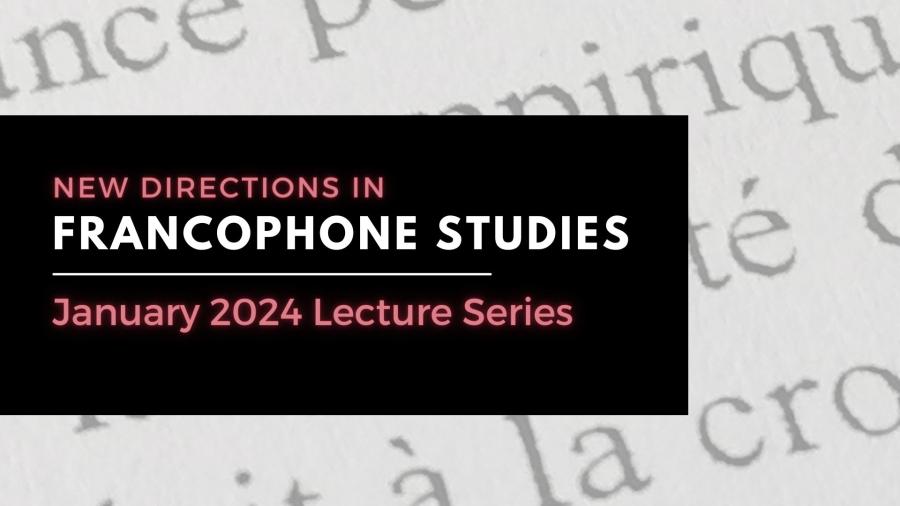Presented by the Department of Romance Languages and Literatures, the “New Directions in Francophone Studies” lecture series will consist of four talks, to be held throughout January.
- Tuesday, January 9 at 12:30 p.m. in Classics 110: "African Writers and the Politics of Literary Recognition"
- Madeline Bedecarré, Visiting Assistant Professor, Department of Romance Languages and Literatures, Bowdoin College
- Friday, January 12 at 4:30 p.m. in Cobb 301: "The not-so-simple nomination des choses: Pastoral, Place, and Paratexts in Senghorian Poetry"
- Amber Bal, PhD Candidate, Department of Romance Studies, Cornell University
- Tuesday, January 16 at 12:30 p.m. in Classics 110: "Ousmane Sembène and the Drums of Interpellation"
- Akrish Adhikari, PhD Candidate, Department of French and Italian, Princeton University
- Friday, January 19 at 4:30 p.m. in Cobb 301: "Croaking Frogs and Singing Youth: When the Francophone Novel Meets Séga Engazé"
- Nikhita Obeegadoo, Assistant Professor of Francophone & African Transcultural Studies, University of British Columbia
"African Writers & the Politics of Literary Recognition" (Madeline Bedecarré)
In 2018 President Macron launched a series of initiatives meant to further spread the French language around the world. At the Académie française where he outlined this enterprise, the prize-winning francophone African writers Gaël Faye and Véronique Tadjo flanked the president, who quoted eight different Sub-Saharan African authors during his speech. Standing at the literal heart of hegemonic French, he held African writers as responsible for and representative of Francophonie.
In this talk, I will interrogate this vision of Francophonie: a political project and a literary classification typically represented by Sub-Saharan African authors.
This talk considers how a political institution (the Organisation internationale de la francophonie) lastingly changed the landscape for African authors through the sponsorship of literary prizes. I will show how these prizes incubated an African literature in French while also analyzing the constraining effects they had on the production of texts at the level of form.
"The not-so-simple nomination des choses: Pastoral, Place, and Paratexts in Senghorian poetry" (Amber Bal)
Taking my cue from Léopold Sédar Senghor’s mysterious remark about the simplicity of “naming things” (la simple nomination des choses) in his postface to Éthiopiques, this talk will explore the overlooked “pastoral” strain within Senghorian poetry. Investigating eruptions of this pastoral “tonic key” renews meditations on how and to what end rurality, paradise, and utopia actually figure as spaces within Senghor’s poetic oeuvre.
"Ousmane Sembène and the Drums Of Interpellation" (Akrish Adhikari)
This talk focuses on a reading of Ousmane Sembène’s novel, God’s Bits of Wood [Les bouts de bois de Dieu] (1960), a fictionalized tale about labor strikes that took place in French West Africa in the late 1940s. In particular, I theorize the role of drumming as the media technology of anticolonial interpellation, that is, how drums are essential for calling out to workers and inaugurating their turn from colonial to anticolonial subjectivity.
"Croaking Frogs and Singing Youth: When the Francophone Novel Meets Séga Engazé" (Nikhita Obeegadoo)
Ananda Devi’s Ève de ses décombres (2006) is an award-winning novel that depicts the underside of the Mauritian postcard. Woven into its French prose is “krapo kriyé” (1981), the island’s most famous example of the séga engazé (a local musical form, with lyrics in Mauritian Creole and themes of social injustice, that is rooted in the island’s history of plantation slavery). My presentation delves into the various dimensions of such intertextuality. On one hand, I trace how any attempt to reproduce music in written format remains unsatisfactory, if not problematic. On the other, I suggest that the séga engazé functions as an alternative aesthetic form within the francophone novel, thus drawing attention to experiences sidelined by the official Mauritian narrative. Furthermore, I argue that such intertextuality acts as both a trigger of “multidirectional memory” (Michael Rothberg) and an example of a “subversive tactic” (Françoise Lionnet and Emmanuel Bruno Jean-François) that allows Devi’s work to resist hegemonies and retain local specificities, while powerfully appealing to a global audience.

